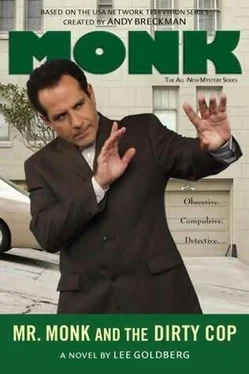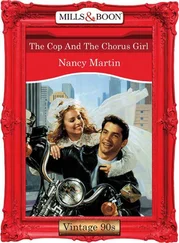“We would have.” Disher picked up his fallen notebook. “What he wrote on one page would have left an indentation on the page underneath. I could have rubbed my pencil over it and revealed what he wrote. It’s an old trick I learned on the streets.”
“The Sesame Streets,” Stottlemeyer said.
“I’m not ready to say who the killer is,” Monk said. “There’s still one more thing I need to know before I can be certain that I’m right. And the only one with the answer is Judge Carnegie’s widow.”
“Her husband was just gunned down,” Stottlemeyer said. “The poor woman is devastated. Couldn’t you find out another way?”
“I need to talk to her,” Monk said.
“Does it have to be right now?” Stottlemeyer asked. “Can’t it wait until tomorrow?”
Monk shook his head. I’m not sure whether he was disagreeing with the captain or simply trying to stay awake.
Stottlemeyer groaned his assent and started trudging down the street. We all joined him.
“Sometimes I hate being a cop,” he said.
“So quit and work for me,” Slade said. “You, Monk, and Natalie would make a great team.”
“The Odd Squad,” I said.
Mr. Monk Is All Bite and No Bark
The row of houses on the Carnegies’ street and on the next street and the one after that were virtually identical, the uniformity broken only slightly by flip-flopped floor plans or tweaks to the facades to evoke various architectural styles, like French provincial or space-age contemporary.
The homes sold for $4,000 when they were built in the 1930s and were now going for $800,000 or more if they were in good shape. The Carnegies’ home was mint, literally in its color and figuratively in its condition.
There was something cartoonish about the houses and their vibrant colors. The ceramic squirrels, bunnies, deer, and garden gnomes that dotted the Carnegies’ front yard landscaping only added to the storybook effect.
Stottlemeyer knocked on the front door. Almost immediately we heard barking, growling, and scratching and then the sound of claws being dragged along the floor as someone tried to restrain the dog. I hoped the Carnegies didn’t have hardwood floors in their entry hall.
After a moment, the barking sounded more muffled and distant and the door was opened by a woman who’d obviously been crying. She was wearing jeans and a button-down sweater that she clutched tightly closed over her shirt. Her eyes were bloodshot from crying. Her hair was the same unnatural shade of brown as her husband’s. They must have shared the same bottle of hair coloring. That’s real marital intimacy.
I heard the dog barking and scratching behind some door deep inside the house and I couldn’t resist glancing at the floor. The entry hall tile was covered with claw marks.
“Mrs. Carnegie,” Stottlemeyer said. “I am very, very sorry to disturb you right now. I hope you can forgive me. We have one more question that can’t wait.”
She nodded and sniffled. “It’s no problem, Captain. I want to do whatever I can to catch the bastards who took my husband from me.”
“Does your dog always bark like that?” Monk asked.
“Only around strangers. He’s really a sweetheart with people he’s learned to trust,” she said, her lower lip beginning to tremble. “Thank God he was spared. He’s like our child. I don’t think I could survive losing both Alan and Sweetie.”
Mrs. Carnegie started to shake and cry, her shoulders heaving.
Stottlemeyer looked back at Monk. “Hurry up and ask your question.”
“I just did,” Monk said.
Stottlemeyer glared at him. “You had us rush over here and intrude on Mrs. Carnegie’s privacy just to ask her about her dog?”
“I also thought it would be a good idea to arrest her now and secure the scene before she had a chance to get rid of any more evidence.”
Mrs. Carnegie stood up straight, her eyes going wide.
Slade turned to Monk in shock. “You’re saying that she killed the judges?”
“She’s the one,” Monk said.
Mrs. Carnegie started to slam the door in fury but Stottlemeyer threw his shoulder against it, preventing it from closing.
“I don’t think you want to do that, Mrs. Carnegie,” Stottlemeyer said, his tone of voice no longer so solicitous. “Perhaps it would be better if you stepped outside.”
It wasn’t really a suggestion and she knew it. She reluctantly stepped out onto the stoop.
“My husband, the love of my life, was just slaughtered outside my door,” she said. “And you want me to submit myself to this abuse? Who is this horrible man?”
“Someone who has never been wrong about murder,” Stottlemeyer said. “Why did she kill her husband?”
“I have no idea,” Monk said.
“That’s helpful,” Stottlemeyer said.
“Can I go back inside now?” Mrs. Carnegie said. “Or do you want to torture me some more?”
“But I know why she killed Judge Stanton,” Monk said. “She knew that her husband was the designated alternate to hear the case against Salvatore Lucarelli if anything happened to Stanton. She wanted Judge Carnegie’s murder to look like a mob hit.”
“You’re insane,” she said, then turned to Stottlemeyer. “You should be ashamed of yourself.”
“I assume you have some strong evidence,” Stottlemeyer said to Monk.
“You mean besides the fact that she’s a woman, that her height matches the dimensions of the bicycle, and that she’s wearing the Nike running shoes that match the footprint left in the dirt?”
We all gave her the once-over. Not only did I notice that everything Monk said was true, but her tears seemed to dry up and her expression of mourning had turned to one of barely contained rage.
“There are thousands of women in San Francisco who are my same height, and who own a pair of these shoes,” she said. “You pathetic little man.”
“That’s true,” Monk said. “But we also have an eyewitness.”
“Who?” Disher asked.
“Sweetie,” Monk said. “The neighbors reported hearing the gunshots but didn’t say anything about a dog barking.”
“Don’t call me Sweetie,” Disher said. “I’m a grizzled, battle-scarred hard-ass.”
“He’s referring to her dog,” I said.
“If the dog always barks around people he doesn’t know,” Monk said, “why wasn’t he barking when Judge Carnegie was confronted and shot by a stranger?”
“Because it wasn’t a stranger,” Stottlemeyer said, and looked at Mrs. Carnegie. “The dog wasn’t trying to drag his master away after the shooting; he was trying to follow you back home.”
“The dog didn’t start barking until you fled and other people began to approach him,” Monk said. “And the dog didn’t stop barking until you returned.”
She snorted derisively. “That’s all you’ve got?”
“You’re under arrest,” Stottlemeyer said. “Read this woman her rights, Lieutenant.”
Disher did and took out his handcuffs.
“I’ve been a judge’s wife for twenty-three years, Captain. I know how they think,” she said as Disher cuffed her hands behind her back. “This isn’t evidence. It’s unfounded speculation. You don’t have enough to hold me for more than a few hours.”
“But it’s enough probable cause to get us a search warrant,” Stottlemeyer said. “The bike and the hooded jacket may be gone but you haven’t had the opportunity to ditch the gun yet. That should keep you in a cell while we uncover your motive.”
Her wide-eyed reaction was as good as a confession. Stottlemeyer would find the gun.
Disher led her away. Slade motioned Monk and me off to one side, leaving Stottlemeyer by himself at the front door.
Читать дальше







![О Генри - Фараон и хорал [The Cop and the Anthem]](/books/415669/o-genri-faraon-i-horal-the-cop-and-the-anthem-thumb.webp)




